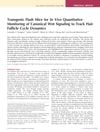Macrophages Promote Wound-Induced Hair Follicle Regeneration in a CX3CR1- and TGF-β1-Dependent Manner
April 2018
in “
Journal of Investigative Dermatology
”

TLDR Macrophages help hair growth after injury through CX3CR1 and TGF-β1.
This study found that macrophages play a crucial role in promoting hair follicle regeneration after a wound, in a manner dependent on the CX3CR1 receptor and TGF-β1. The researchers used a mouse model and found that depletion of macrophages led to reduced hair growth in the injured area. These findings suggest that targeting macrophages and their signaling pathways could be a potential therapeutic strategy for promoting hair growth in individuals with hair loss or alopecia.










